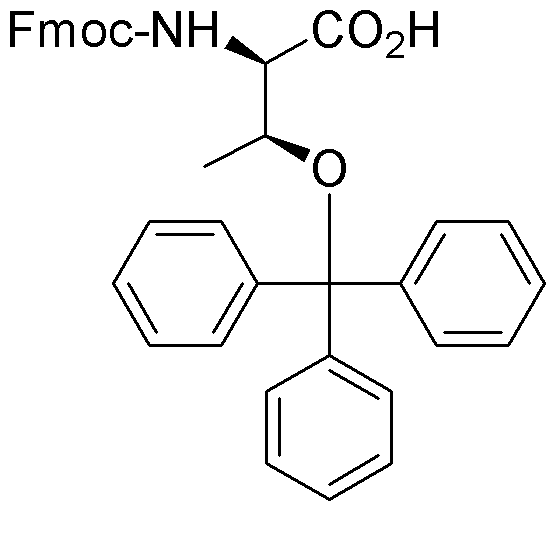Fmoc-O-trityl-D-threonine is widely utilized in research focused on
- Peptide Synthesis: This compound serves as a protecting group in the synthesis of peptides, allowing for the selective modification of amino acids without interfering with other functional groups. This is particularly useful in the pharmaceutical industry for developing new drugs.
- Bioconjugation: It is employed in bioconjugation techniques to attach biomolecules, such as proteins or nucleic acids, to surfaces or other molecules. This application is vital in the development of targeted therapies and diagnostics.
- Research in Protein Engineering: Researchers use this compound to study protein folding and stability, which can lead to advancements in enzyme design and therapeutic proteins, enhancing drug efficacy.
- Development of Antibody-Drug Conjugates: Fmoc-O-trityl-D-threonine is instrumental in creating antibody-drug conjugates, which are designed to deliver cytotoxic drugs directly to cancer cells, minimizing damage to healthy tissue.
- Custom Synthesis Services: Companies specializing in custom peptide synthesis utilize this compound to provide tailored solutions for clients in academia and industry, ensuring high-quality and specific peptide sequences for research and therapeutic purposes.
General Information
Properties
Safety and Regulations
Applications
Fmoc-O-trityl-D-threonine is widely utilized in research focused on
- Peptide Synthesis: This compound serves as a protecting group in the synthesis of peptides, allowing for the selective modification of amino acids without interfering with other functional groups. This is particularly useful in the pharmaceutical industry for developing new drugs.
- Bioconjugation: It is employed in bioconjugation techniques to attach biomolecules, such as proteins or nucleic acids, to surfaces or other molecules. This application is vital in the development of targeted therapies and diagnostics.
- Research in Protein Engineering: Researchers use this compound to study protein folding and stability, which can lead to advancements in enzyme design and therapeutic proteins, enhancing drug efficacy.
- Development of Antibody-Drug Conjugates: Fmoc-O-trityl-D-threonine is instrumental in creating antibody-drug conjugates, which are designed to deliver cytotoxic drugs directly to cancer cells, minimizing damage to healthy tissue.
- Custom Synthesis Services: Companies specializing in custom peptide synthesis utilize this compound to provide tailored solutions for clients in academia and industry, ensuring high-quality and specific peptide sequences for research and therapeutic purposes.
Documents
Safety Data Sheets (SDS)
The SDS provides comprehensive safety information on handling, storage, and disposal of the product.
Product Specification (PS)
The PS provides a comprehensive breakdown of the product’s properties, including chemical composition, physical state, purity, and storage requirements. It also details acceptable quality ranges and the product's intended applications.
Certificates of Analysis (COA)
Search for Certificates of Analysis (COA) by entering the products Lot Number. Lot and Batch Numbers can be found on a product’s label following the words ‘Lot’ or ‘Batch’.
*Catalog Number
*Lot Number
Certificates Of Origin (COO)
This COO confirms the country where the product was manufactured, and also details the materials and components used in it and whether it is derived from natural, synthetic, or other specific sources. This certificate may be required for customs, trade, and regulatory compliance.
*Catalog Number
*Lot Number
Safety Data Sheets (SDS)
The SDS provides comprehensive safety information on handling, storage, and disposal of the product.
DownloadProduct Specification (PS)
The PS provides a comprehensive breakdown of the product’s properties, including chemical composition, physical state, purity, and storage requirements. It also details acceptable quality ranges and the product's intended applications.
DownloadCertificates of Analysis (COA)
Search for Certificates of Analysis (COA) by entering the products Lot Number. Lot and Batch Numbers can be found on a product’s label following the words ‘Lot’ or ‘Batch’.
*Catalog Number
*Lot Number
Certificates Of Origin (COO)
This COO confirms the country where the product was manufactured, and also details the materials and components used in it and whether it is derived from natural, synthetic, or other specific sources. This certificate may be required for customs, trade, and regulatory compliance.


